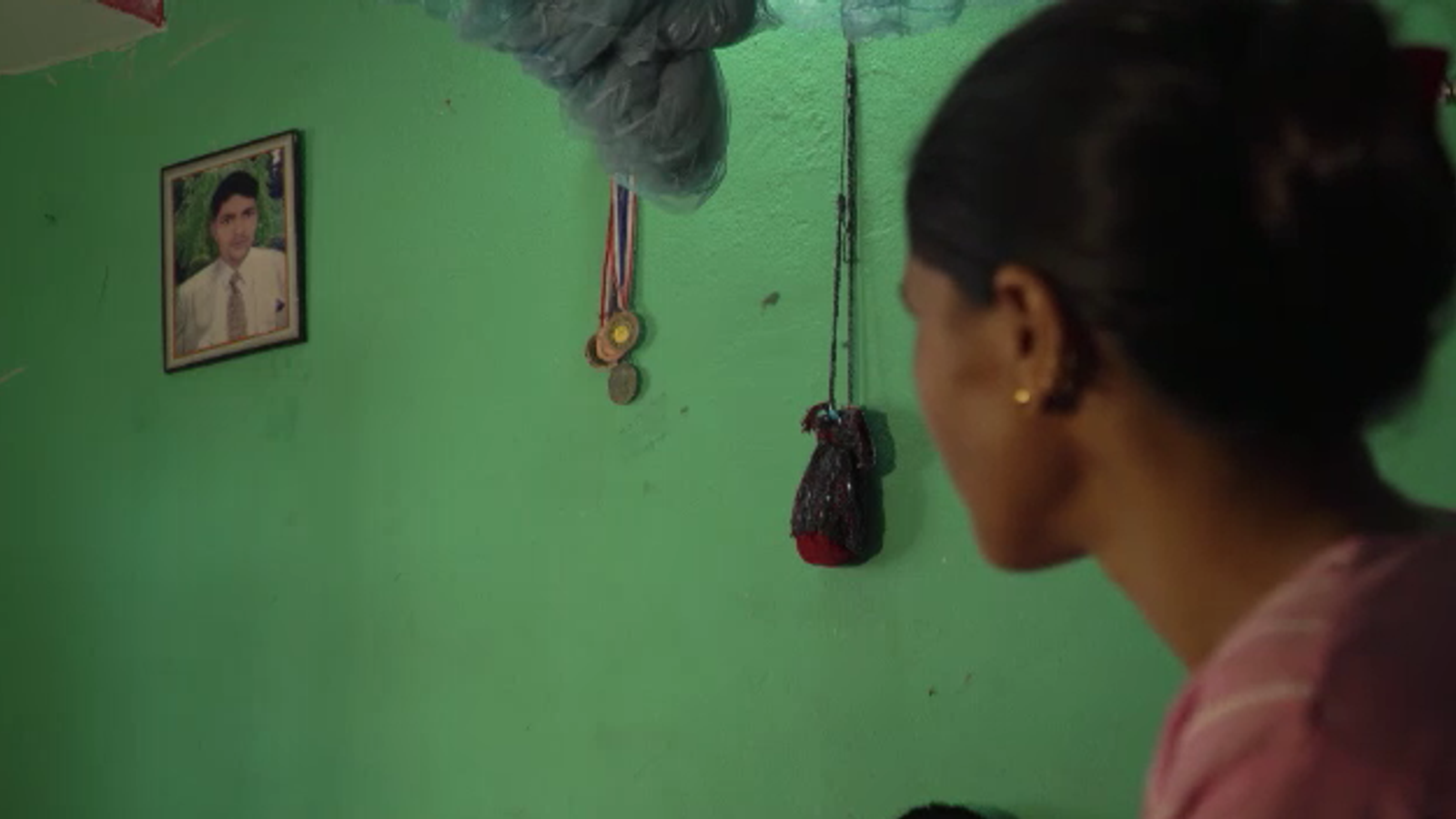To provide a living for his family, Kashiram Belbase joined the thousands leaving Nepal to build Qatar’s infrastructure to host the World Cup.
“We needed to build a house, send children to school, and manage the family,” recalled his wife, Dhankala.
“We had no money to manage everything. That’s why he went.”
And where he died.
In a Nepalese village, a son and daughter are now without their father.
Part of the vast low-paid migrant workforce from the Indian subcontinent in Doha, the 32-year-old was helping to build the metro transport system when he was found dead.
A premature death put down to underlying causes by Qataris. Respiratory failure his wife fears was caused by working in gruelling conditions in the desert nation.
US extreme skier Hilaree Nelson who fell from eighth highest mountain is buried by Sherpas in Nepal
US climber Hilaree Nelson found dead after fall from Mount Manaslu in Nepal
US mountaineer Hilaree Nelson missing on Mount Manaslu in Nepal
“When I heard about the heart attack,” she told Sky News, “I felt it might be possible as it is extremely hot there.”
The anguish is deepened by the unanswered questions about her husband’s death and the lack of significant compensation from Qatar – effectively just the pay he was owed.
“Had we still been together, for example, it would not have been difficult for me to fulfil our children’s needs,” Dhankala weeps in the family home, where her husband’s picture hangs on the green walls.
“I feel they should have looked after us since Qatar is a rich country. No one from there provided us any kind of support.
“They only bore the cost of transportation of the body to Kathmandu from there.”
The sense of frustration – at times anger – is why in the weeks before the World Cup starts, European football federations, including the English and Welsh, are lobbying for a Qatari compensation fund.
As a family grieves far from the glitz of Qatar, the hope is the world’s biggest stars use their status to make an impact beyond the pitch.
“As they come to play there, they should appeal for providing support to the family of those who lost their lives while building the infrastructure,” 33-year-old Dhankala says.
“I wish they could support us and make an appeal. They could take care for the family.”
Government officials were not made available to speak to Sky News during a week-long visit in Qatar, where the UN’s labour agency assesses progress in improving rights and conditions for workers.
“We do need to have stronger investigations, whether they’re health investigations or labour investigations, to determine whether work could have played a factor in the worker’s death,” Max Tunon, head of the International Labour Organisation’s Doha office, told Sky News.
Mr Tunon recognises Qatar has made progress raising standards as the country has expanded since winning the FIFA World Cup vote in 2010.
The tournament is leaving a legacy with the introduction of a minimum wage and efforts to dismantle the Kafala system that ties workers to their employers.
“There’s greater labour mobility, greater freedoms, greater empowerment for workers,” he said.
“But we also know that there are huge issues that still exist, the full implementation of the Kafala reforms, it’s still a challenge for us, wage protection abuses are still too common and the rights of domestic workers you know, there’s new legislation protecting them in terms of working time, that right to the day off, but often we see a degree of non-compliance in these areas.”
With the tournament opening on 20 November, the window is shortening for football to push for changes and ensure their presence in Qatar does not contribute to more suffering by workers.
“We’ve been trying to facilitate the role that football associations can play in doing their due diligence, but also engaging with worker management committees in their hotels, and also with the other contractors that they engage with during the World Cup,” Mr Tunon said.
“They need to talk to workers, talk to the worker representatives in the hotels to find out, what are the actual challenges or the issues that they face. Perhaps there are challenges, perhaps their success stories.”
Progress that is often undermined by the lack of clarity of why so many workers like Mr Belbase have died so young to ensure this tiny nation can cope with the influx of hundreds of thousands of fans for 64 matches in 29 days.
In the fierce heat, the final arduous touches are being made to ensure Qatar is World Cup ready.
The hope will be Qatar’s advances in labour rights continue after FIFA has left and there is no more unnecessary suffering.










